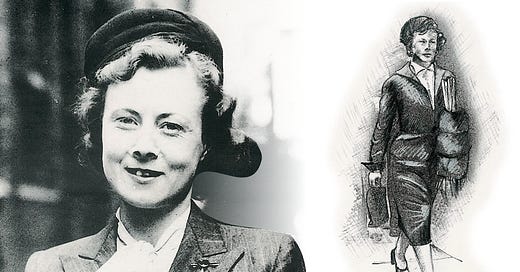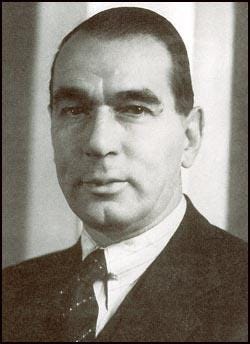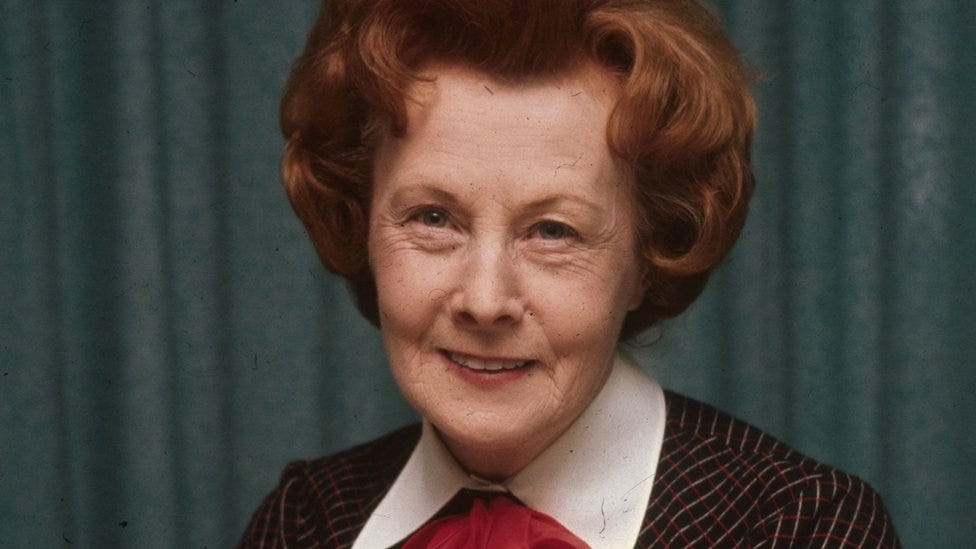One afternoon in 1932, 22 year old Barbara Betts and her mother Annie went to a meeting at the Hyde Labour Club in Cheshire, to hear a man called William Mellor speak. Mellor was tall, dark and handsome, in his early forties, and immaculately dressed in a Savile Row suit with kid gloves and a silk handkerchief. He had arrived in a chauffeur-driven car, and everything about him amazed and appealed to the young Barbara. She was finding life hard, having recently returned home from three years at Oxford with her ‘tail between her legs’, as she put it - she had studied at St Hugh’s College for a degree in PPE, but had found it hard to fit in with the public school girls she mostly met there. She had spent too much time at the Labour Club, and the rest of the time trying to lose her virginity, and her studies had fallen behind. Her finals brought her only a third class degree, and now she was unemployed.
William Mellor was 44, and a very well-connected senior member of the left wing of the Labour Party. From a Unitarian family, he too had failed at Oxford, not even finishing his degree, and had taken a job as a journalist on the Daily Herald. This had brought him success and a good income, but more importantly had brought him into contact with other leading Socialist thinkers, chiefly GDH Cole. At one point in the early 1920s he had been a member of the Communist Party, but was now a leading member of the Socialist League, a ginger group working within the Labour Party to rebuild the party after the catastrophe of the Ramsay Macdonald ‘betrayal’, and to prepare the party for government again. Above all, Mellor was a believer in the power of the working man, if only he could be recruited to the cause of Socialism. ‘I have spent as much on my lunch as you earn in a week,’ he roared at the audience in the Hyde Labour Club, ‘How much longer are you going to put up with it?’
Annie Betts was as impressed by all of this as was her daughter, and invited Mellor back for tea. Within a few days Mellow was paying court to Barbara, taking her for dinners at the Midland Hotel in Manchester, and to tea in Buxton. Although he lived in London, he was on a lecture tour of Labour Clubs across the north, and the Betts were delighted to offer him a room whenever he was passing. It was clear that he and Barbara had fallen in love, and one night, according to Barbara, she took the initiative and led him to bed. The problem was that Mellor was married, to a woman called Edna, and had a baby son. In the morning, Mellor went to speak to Barbara’s parents, to explain the situation. Frank replied ‘I never expected a man to come to me and tell me that his intentions towards my daughter were strictly dishonourable.’
For the next ten years, William and Barbara would continue to enjoy a passionate, loving and semi-public affair. William was as open and honest with his wife Edna as he was with the Betts family, but Edna would not give him a divorce. The 1923 Matrimonial Causes Act gave Edna the right to petition for a divorce, on the grounds of her husband’s adultery, but she chose not to. Of course there were complications - there was a young child, and William liked to live in some some comfort: supporting two households would have cramped his style. Also the scandal of a divorce might have harmed his chances of being chosen as a prospective Labour MP. One might say, luckily for him, that although Barbara found the situation difficult, she was prepared to stick it out. For one thing, being at William’s side gave this fiercely ambitious woman access to the highest echelons of the Labour party - soon she was on first name terms with Nye Bevan and his wife Jennie Lee (who herself had had an affair with a married man for many years before she met Nye), with Douglas and Margaret Cole, with Victor Gollancz the left wing publisher, and the prominent Labour MP Sir Stafford Cripps. She enjoyed her freedom, and was happy to be seen as one of the New Women. As Beatrice Webb the Fabian Socialist had written ‘The political emancipation of women and their entry into public life has swept away the old requirement of chastity in unmarried women.’
As Anne Perkins puts it, in her biography of Barbara Castle, Red Queen, William’s lover was romantic by nature, radical by upbringing, and a self-dramatist by instinct. She was the third child in the family, constantly competing for her father’s attention and to outshine her clever older brother and sister. She was small, pretty, with pale skin and copper-red hair, and she had taught herself to have a commanding public presence - speaking as an officer at the Oxford Labour Club (although not at the Oxford Union, where women could only watch). 1932 was the year she finally managed to find a job, as a demonstrator in department stores for a sweet-making company. Not a job for a shrinking violet.
Barbara’s background was relatively comfortable, her father Frank was a tax inspector and the family moved around the north of England from Chesterfield, where Barbara was born, to Pontefract, then to Bradford where Barbara was Head Girl at the Grammar School, and then to Hyde in Cheshire. Barbara’s mother was a Labour Councillor, and Frank Betts was a radical socialist, who in his spare time became the editor of the Bradford Pioneer, a left-wing newspaper. Their family life would have been even more prosperous if Frank was not also supporting a long-term mistress, a teacher called Nell. Barbara and her mother only found out about Nell after Frank died in 1945. It may be that this secret life made Frank less fierce with William Mellor than most other middle class fathers in the 1930s would have been.
In place of her sometimes difficult relationship with her father, Barbara now had William, as alternate father, mentor, political adviser, but above all as devoted admirer. He wrote to her ‘I have loved you since the first day I saw you.’ He was prepared to face whatever the world might think of their relationship ‘If it be that the world would frown on us…then the world is foolish and unwise.’ But there was no plain-sailing. Barbara lost her job at the confectionary company, and moved to London where she survived on part-time journalism. Mellor lost his job at the Daily Herald, and threw his energies into campaigning for the Enfield parliamentary seat. But he was less focused on winning an election than he should have been, saying he wasn’t trying to win, ‘I’m trying to make the workers of Enfield, socialists.’ The Labour Party in the 1930s was hopelessly riven by internal conflict. Suspicion of the Communists, especially among the Trade Unionists, made the Labour Party slow to react to the rise of the far right in Europe: Mellor was part of the group desperate to join with other left-wing organisations to form a united front against the Fascists. Against this difficult, sometimes desperate struggle, Barbara’s hopes that he might leave his wife just caused more stress and unhappiness.
In 1937, Sir Stafford Cripps and Nye Bevan launched Tribune, a left wing periodical, with Mellor as editor. Barbara was given a staff job, along with her best friend and supporter, the young Michael Foot. That same year she was sent to Russia, and contributed a handful of articles for Tribune on what she found there. She threw herself into London politics, getting elected as a member of St Pancras Borough Council, and began to get some national public profile, having complained when the Tory Leader referred to her in a public meeting as ‘the charming young lady.’ She kicked up a fuss, and the Daily Mail ran the headline ‘The Girl Who Bans Flattery ‘ - along with no doubt a very attractive photograph. As 1939 approached, and then war broke out, Barbara’s responsibilities and journalism kept her too busy to worry about William’s dilemmas. In 1941 she joined the Ministry of Food as a temporary civiln servant under Dr Edith Summerskill, working on kipper rationing and the marketing of that unattractive fish, the snoek. 1
In 1942, William fell ill with a stomach ulcer, no doubt exacerbated by the strain he was under. He went into hospital for a routine operation, Barbara visited him there and all seemed well, but five days later she received the message that he had collapsed and died. Somehow, supported by Michael Foot, she got through the funeral: Edna had chosen not to attend, and the two women never met. She was not the only woman facing heartbreak and loss in wartime, of course, so she struggled on, but through what Jennie Lee had also experienced, the ‘grief compounded by exclusion.’
In May 1943, Barbara made a speech at the Labour Party Conference that got the attention of the left wing Daily Mirror - someone suggested to the Night Editor, Ted Castle, that he should run a feature on her. A year later they were married.
When I was growing up, Barbara Castle’s name was only ever mentioned by my Tory mother if accompanied by a mild expletive. ‘That b… woman.’ She was a politician who was never afraid to make enemies, who is as much remembered for her unpopular attempt to legislate the Trade Union movement with her ‘In Place of Strife’ bill, as for the work she did with the women strikers at Dagenham. She was the non-driver who spoiled the motorist’s fun by introducing seatbelts and the breathalyser. But through all her years as a Cabinet Minister and a senior Opposition politician, I do not remember that her ten years of living ‘in sin’ with a married man were ever mentioned. The power of being married to the Press? Certainly, the scandal that never was.
For more about Dr Summerskill and the snoek, read on!










Small in stature, big in personality. I didn’t much like her politics, but I admired the woman, who had an almost impossible job thanks to Harold Wilson’s attempts to please everyone. Thanks for reminding me about a politician worth remembering.
Another SSAC member of whom I was fond was Robin Wendt. As well as being seriously brilliant, he was quiet, approachable and kind. I remember having breakfast with him at our Belfast hotel in 1983, his hair wet from the shower. I also remember the occasion when my difficult civil service boss cancelled a monthly SSAC meeting at short notice. Somehow, (thanks to my eccentric, possibly demented assistant) the message of the cancellation did not get through to Robin and he turned up at New Court eager to get down to business. My boss was furious that he should have been inconvenienced but Robin was not. He cheerfully said that he could relax and look around the London shops for a Christmas gift for his daughter.
When I knew him, Robin was CEO of Cheshire County Council, a post he had held since he was a mere boy of 38.He had been at the council since 1975. Previously he had been a star civil servant, reaching the grade of assistant secretary (Grade 5) at the DHSS (Department of Health and Social Security). He graduated in PPE from Wadham College (the alma mater of my headmaster, JA Stocks, who encouraged me to apply, but I was too feckless).
In 1962, Robin joined the Ministry of Pensions and National Insurance, which later became the DHSS. He became PPS (principal private secretary) to the Labour social services secretary Richard Crossman. Barbara Castle was Secretary of State for Social Services from 1974 to 1976. Castle introduced a wide range of innovative welfare reforms, and Robin Wendt was her right-hand man, working on the legislation.
Robin died in 2021 at the age of 80.